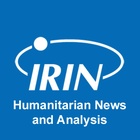Save the oceans from warming
Save the oceans from warming
WARSAW, 18 November 2013 (IRIN) – The Earth’s oceans are being forced to absorb more and more planet-warming carbon dioxide (CO2) emissions, causing them to acidify at rates not seen in the last 300 million years, says a new report released for policymakers today at the UN climate talks in Warsaw.

A sliver of a silver lining/ Photo: Guy Oliver/IRIN
The oceans supply the oxygen in every second breath we take, and also absorb at least 33 percent of the CO2 human beings produce. Acidification not only limits the capacity of oceans to absorb CO2 but has the potential to affect food security. Within decades, large parts of the polar oceans will become corrosive, particularly affecting marine organisms unprotected by shells, such as squids.
The report is a summary of the state of scientific knowledge on ocean acidification, based on the latest research presented at the Third Symposium on the Ocean in a High-CO2 World, held in Monterey, California, in September 2012. Scientists from across the globe involved in the research urged countries in Warsaw to work towards limiting the global temperature increase to less than two degrees Celsius by the end of this century.
Stefan Rahmstorf, Head of Earth System Analysis at Potsdam University, Germany, writes in a recent web-post that the “increase in the amount of heat in the oceans amounts to 17 x 1022 Joules over the last 30 years. That is so much energy it is equivalent to exploding a Hiroshima bomb every second in the ocean for thirty years”.
The oceans are also becoming more acidic. The acidity or alkalinity of aqueous solutions is measured by the pH scale, and the lower the number, the more acidic the solution. As CO2 dissolves in seawater, its pH decreases – a process known as acidification.
This can reduce the availability of calcium – which is alkaline – for plankton and shelled species, threatening their survival. Much of the marine food chain depends on these organisms for food, so the entire ecosystem could be affected.
Fisheries support the livelihoods of 540 million people, or eight percent of the world’s population, says Wendy Broadgate, Deputy Director, Natural Sciences, for the International Geosphere-Biosphere Programme, one of report’s sponsors. “However, very little is known about the direct effects of ocean acidification on fish that are the target of commercial and subsistence fishing, which results in high uncertainties in predicting changes in fisheries in the future.” Scientists continue to research this aspect, she added.
But they do know more about the impact of these changes on molluscs such as squid, oysters and cuttlefish, which “appear to be one of the most sensitive groups of organisms studied under ocean acidification regimes”, says Broadgate. The scientists estimate that by 2100, declines in mollusc production could lead to annual global economic losses of more US$130 billion (at 2010 price levels) if man-made emissions remain as they are.
She notes that “oyster larvae in hatcheries in the northeast Pacific Ocean region are very sensitive to ocean acidification and are already affected by low pH waters, and they are shutting off their seawater intake when… [it] has lower pH.”
“There is hope if countries aim to lower emissions so that the global increase in temperature by the turn of century remains less than two degrees Celsius”
One of the major concerns is whether the ocean has reached a limit beyond which it would be unable to absorb more heat. Richard Feely, a senior scientist at the US government’s National Oceanic and Atmospheric Administration (NOAA), says computer-generated climatic models “suggest a decreasing trend in the fraction of anthropogenic [by human activity] CO2 emissions taken up by the oceans over this century, but the observations have not been able to confirm this trend yet because of the uncertainties in the measurements as well as a lack of complete coverage of the oceans with measurements. Consequently, this is a topic for which more research is required.”
There is hope if countries aim to lower emissions so that the global increase in temperature by the turn of century remains less than two degrees Celsius.
Broadgate says, “Significant emissions reductions could ensure 50 percent of surface waters remain favourable for coral reef growth and corrosive conditions in most of the Southern Ocean can be avoided.”
Shellfish fisheries and aquaculture in some areas may be able to cope by adjusting their management practices to avoid ocean acidification impacts, she added. “For example, seawater monitoring around shellfish hatcheries can identify when to limit the intake of seawater with a lower pH, hatcheries can be relocated, or managers can select larval stages or strains that are more resilient to ocean acidification for breeding.”
At a local level, the report suggests few mitigation measures other than developing sustainable fisheries management practices such as regulating catches to reduce overfishing. The writers urge governments to protect their coasts and the habitats of fishes by maintaining protected areas that will help make them resilient. The scientists also ask for monitoring and regulating “localised sources of acidification” such as the runoff from fertilisers, and reducing sulphur dioxide and nitrous oxide emissions from coal-fired plants and ship exhausts.
By Jaspreet Kindra
IRIN
###
About the Integrated Regional Information Networks (IRIN)
IRIN – standing for Integrated Regional Information Networks – has its head office in Nairobi, Kenya, with regional desks in Nairobi, Johannesburg, Dakar, Dubai and Bangkok, covering some 70 countries. The bureaus are supported by a network of local correspondents, an increasing rarity in mainstream newsgathering today.
IRIN is an award-winning humanitarian news and analysis service covering the parts of the world often under-reported, misunderstood or ignored.
It delivers unique reporting from the frontlines of humanitarian action to over a million online readers.
IRIN helps make a difference in three key ways:
▪ Humanitarian decision-makers better allocate resources
▪ Relief workers are better informed
▪ Media and the general public become aware and engaged
IRIN’s editorial team bring a huge range of experience, diversity and multimedia skills to bear – with a product range that spans text, film, photography and hard-copy publications.
IRIN is a remarkable success which, with strong donor support, has defined and successfully occupied a unique niche. By listening to its readers, it continues to evolve and contribute to better-informed and more effective humanitarian action.

###
About the United Nations Office for the Coordination of Humanitarian Affairs (OCHA)
OCHA is the part of the United Nations Secretariat responsible for bringing together humanitarian actors to ensure a coherent response to emergencies. OCHA also ensures there is a framework within which each actor can contribute to the overall response effort.
OCHA’s mission is to:
- Mobilize and coordinate effective and principled humanitarian action in partnership with national and international actors in order to alleviate human suffering in disasters and emergencies.
- Advocate the rights of people in need.
- Promote preparedness and prevention.
- Facilitate sustainable solutions.
How we deliver
OCHA’s Strategic Framework ensures that OCHA delivers on its core mandate, while responding to contemporary global challenges. The three pillars of the Strategic Framework are:
1. Partnerships: broadening the coalition for multilateral humanitarian action
The scale and scope of global challenges requires working together in new ways, with new partners. Partnership has always been integral to OCHA’s efforts. Sustained relations, built on trust and mutual respect, are vital when preparing for and responding to humanitarian emergencies. OCHA has a unique position within the international humanitarian system to convene and influence agendas. We will do this more strategically, with the aim of creating a more enabling environment for humanitarian action.
2. Service provider: building a better system
The expectations of OCHA have evolved since humanitarian reform. We will ensure that our services and support to partners also evolve and meet clients’ needs. We are focused on helping partners more predictably through humanitarian coordination leadership, strengthening coordination mechanisms, and improving the evidence base for humanitarian decision-making, planning and resource allocation.
3. Reliability and professionalism: creating better staffing and surge solutions to be there when it counts
In 2010, OCHA will introduce surge solutions to ensure the right people are on the ground immediately after a new disaster. This will be coordinated with longer-term staffing to ensure continuity of OCHA presence.
OCHA people
OCHA is its people. From 35 offices around the world, some 1,900 specialized and dedicated OCHA staff work to ensure that effective assistance reaches millions of humanitarian beneficiaries in four continents.

###
> United Nations (UN).
 The United Nations was established on 24 October 1945 by 51 countries committed to preserving peace through international cooperation and collective security. Today, nearly every nation in the world belongs to the UN: membership totals 192 countries.
The United Nations was established on 24 October 1945 by 51 countries committed to preserving peace through international cooperation and collective security. Today, nearly every nation in the world belongs to the UN: membership totals 192 countries.
When States become Members of the United Nations, they agree to accept the obligations of the UN Charter, an international treaty that sets out basic principles of international relations. According to the Charter, the UN has four purposes:
- to maintain international peace and security;
- to develop friendly relations among nations;
- to cooperate in solving international problems and in promoting respect for human rights;
- and to be a centre for harmonizing the actions of nations.
###
* The above story is adapted from materials provided by United Nations (UN)
** More information at United Nations (UN)




















